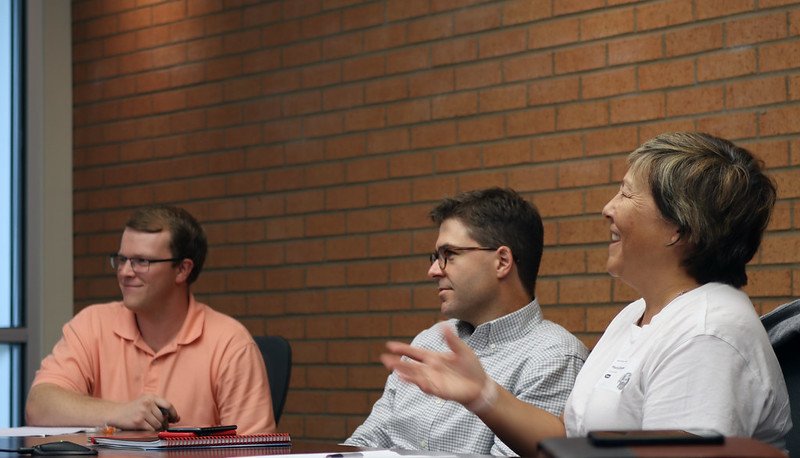UA Cossatot's Office of the Registrar recently released the summer 2022 Chancellor's List, Vice Chancellor's List, and 2022 summer graduates.
Four students are named on the Chancellor's list, maintaining a minimum of 4.0 semester GPA while taking a minimum of twelve college credit hours. Seven students are named on the Vice Chancellor's list, holding a minimum of a 3.5 semester GPA while taking a minimum of twelve college credit hours.
UA Cossatot Summer 2022 Chancellor's List:
Ashdown: Tucker Patrick Tompkins
De Queen: Logan Turner
Texarkana: Anthony Stine and Joseph Benett Cagande Shan
UA Cossatot Summer 2022 Vice Chancellor's List:
Ashdown: Lexius Winfrey and Breana Nicole Noble
Foreman: Jaymee Hess
Gillham: Ariel Morgan Dinkins
Okolona: Lakyn Danielle Watts
Texarkana: Chase Aldwin Hicks and Grant Phillip Nolen
Summer 2022 Graduates (Listed with Highest Degree(s) Earned):
Sixty-one students graduated with a Certificate of Proficiency (CP), Technical Certificate (TC), or an Associate Degree (AA/AGS/AAS/AS). Many students earned multiple certificates and degrees, totaling 93 summer awards.
Amity: Randi Mechelle Markham: Associate of Arts
Antoine: Jessi Ann Dugger: Technical Certificate: General Studies
Ashdown: Mikayla Blagg: Technical Certificate: Practical Nursing, Kellie Anne Jones: Technical Certificate: Health Professions, Raylei Suzzanne Merrell: Technical Certificate: Practical Nursing and
Technical Certificate: Health Professions, Breana Nicole Noble: Associate of Applied Science: Physical Therapist Assistant, Cory Tatom: Associate of Applied Science: Physical Therapist Assistant, Lexy Walden: Technical Certificate: Practical Nursing and Technical Certificate: Health Professions, Lexius Winfrey: Associate of Applied Science: Physical Therapist Assistant and Technical Certificate: Health Professions
Ben Lomond: Kaitlyn Finigan: Technical Certificate: Practical Nursing
Bigelow: Elizabeth Rather: Associate of Science: STEM
De Queen: Sara Elizabeth Abril: Technical Certificate: Practical Nursing and Technical Certificate: Health Professions, Stephanie Butler: Technical Certificate: Practical Nursing and Technical Certificate: Health Professions, Diana Hernandez Galindo: Technical Certificate: Practical Nursing and
Technical Certificate: Health Professions, Layton Jackson: Associate of Arts and
Associate of General Studies, A'Nayzia Janay Jefferson: Associate of Arts and Associate of General Studies, Maria Munoz Juache: Technical Certificate: Practical Nursing and Technical Certificate: Health Professions, Alexandra Salinas: Technical Certificate: Cosmetology, Katherine Rachelle Taylor: Technical Certificate: Practical Nursing, Ivan Trejo: Technical Certificate: General Studies, Logan Wayne Turner: Associate of Arts, Associate of General Studies, and Technical Certificate: General Studies, Emily Brooke Whisenhunt: Technical Certificate: Health Professions
Delight: Madison Erin May: Technical Certificate: General Studies
Dierks: Savannah Nicole Morris: Technical Certificate: Practical Nursing and Technical Certificate: Health Professions, Lindsey Jean Stamps: Technical Certificate: Practical Nursing
Foreman: Danielle Nicole Boyd: Technical Certificate: Practical Nursing and Technical Certificate: Health Professions, Kenzie Elizabeth Cowan: Associate of Science: STEM, Chunjung Ke Howell: Technical Certificate: Practical Nursing
Gillham: Ariel Dinkins: Associate of Science: Business and Technical Certificate: General Studies,
Stephanie Rose Parsons: Technical Certificate: Practical Nursing
Horatio: Heather Barton: Technical Certificate: General Studies, Ashley Olalde: Technical Certificate: Practical Nursing, Misty Marie Wheeler: Technical Certificate: Practical Nursing
Little Rock: Elizabeth Moore: Technical Certificate: Practical Nursing
Lockesburg: Mina Christine McAda: Technical Certificate: Practical Nursing and Technical Certificate: Health Professions
Magnolia: Noah Samuel Reed: Associate of Science: STEM
Murfreesboro: Kailee Ann Backus: Technical Certificate: General Studies, Madison Paige Humphry: Associate of General Studies and Technical Certificate: General Studies
Nashville: LaTambra Shanea Anderson: Technical Certificate: Practical Nursing and Technical Certificate: Health Professions, Kyla Collins: Technical Certificate: Practical Nursing, Allie Michelle Couch: Technical Certificate: Practical Nursing and Technical Certificate: Health Professions, Aaysha Chantel Hollins: Technical Certificate: Health Professions, Jaydon Ray Hostetler: Associate of Science: Business, Jaydon Ray Hostetler: Technical Certificate: General Studies and Certificate of Proficiency: Accounting, Diana Rubio Hernandez: Technical Certificate: Cosmetology, Mattison Nacole Steele: Associate of Arts, Associate of General Studies, and Technical Certificate: General Studies, Takela Rochon Stewart: Associate of Science: Psychology, Associate of Arts, and Associate of General Studies, Jasmin Ariana Summers: Technical Certificate: Health Professions
Ogden: Ariyonna Alise Trotter: Technical Certificate: Practical Nursing and Technical Certificate: Health Professions
Okolona: Lakyn Watts: Associate of Applied Science: Physical Therapist Assistant
Prescott: Ashlynn Glenda Hart: Associate of Applied Science: General Technology
Texarkana: Julie Kate-Lynn Clift: Associate of Science: Psychology, Associate of Arts,
Associate of General Studies and Technical Certificate: General Studies, Chase Hicks: Associate of Applied Science: Physical Therapist Assistant and Technical Certificate: Health Professions,
Grant Phillip Nolen: Associate of Applied Science: Physical Therapist Assistant, Joshua Matthew Robles: Technical Certificate: Health Professions, Joseph Benett Shan: Associate of Applied Science: Physical Therapist Assistant and Technical Certificate: Health Professions, Anthony Stine: Associate of Applied Science: Physical Therapist Assistant and Anthony Stine: Technical Certificate: Health Professions
Umpire: Chloe Wakley: Associate of General Studies
Winthrop: Monica Elane Forrest: Technical Certificate: Practical Nursing, Jaymee Marie Hess: Associate of Applied Science: Physical Therapist Assistant and Technical Certificate: Health Professions, Amy Rachelle Shults: Technical Certificate: Practical Nursing and Technical Certificate: Health Professions
###
The University of Arkansas Cossatot is a community college in Southwest Arkansas accredited by the Higher Learning Commission of the North Central Association of Colleges and Schools. Offering technical certification and Associate degrees, UAC also collaborates with other colleges and universities to offer bachelor's degrees on its three campuses. UAC is an Equal Opportunity/Affirmative Action Institution in compliance with the Higher Education Act of 1965 and other Civil Rights laws and offers equal opportunity for admission and employment. Employment preference is given to applicants possessing a Career Readiness Certificate (CRC) with all other qualifications being equal. Programs and activities of UAC are provided to all students without regard to race, color, national origin, religion, age, disability, Vietnam era veteran or special disabled veteran status, or sex. Questions or concerns regarding affirmative action can be directed to the Compliance Officer, c/o UA Cossatot, 183 College Drive, De Queen, AR 71832. For Arkansas RELAY Voiced Services call 711 or 800-285-1121. Visit www.cccua.edu for more information.





















